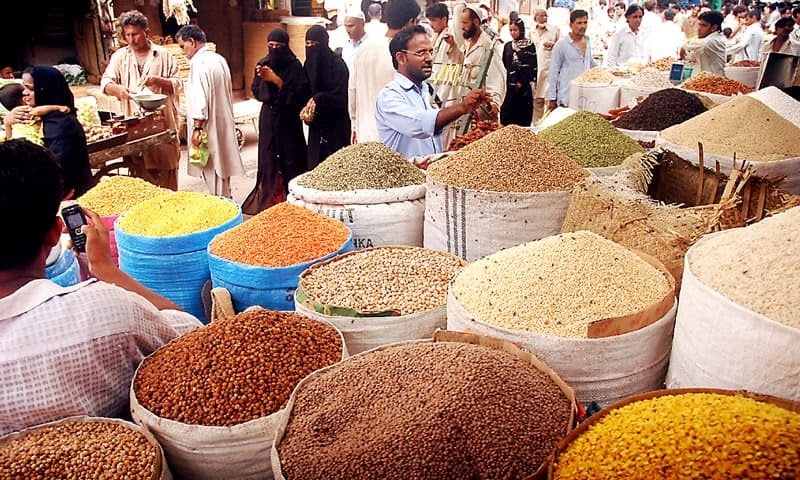ISLAMABAD: Pakistan’s inflation rate slightly eased to 12.63 per cent in December from 12.7pc last month but still scaled the highest level in nine years, the Pakistan Bureau of Statistics (PBS) reported on Wednesday.
Inflation, measured by the Consumer Price Index (CPI) lowered 0.34pc over the previous month. The data released shows that higher food prices have been the largest driver in overall inflation in December. It has also been observed that the prices of essential food items are higher in rural areas than in urban areas.
Food inflation in urban areas rose by 16.7pc in December on a yearly basis but declined 1.7pc on a monthly basis whereas it increased by 19.7pc in rural areas and declined 1.1pc respectively.
In urban areas, the food items which saw an increase in their prices included: dry fruits 6.35pc, wheat 5.62pc, eggs 4.61pc, fresh fruits 2.3pc, pulse moong 1.88pc and fish (1.22pc).
On the flipside, prices of items that declined in urban areas included: tomatoes 36.49pc, onions 12.45pc, chicken 11.21pc, fresh vegetables 4.62pc, sugar 3.54pc, and potatoes 1.96pc.
PM orders country-wide launch of ‘Durust Daam’ application
Similarly, non-food inflation in urban centres was recorded at 9.5pc year-on-year, while it was 8.8pc in rural areas. The rise in non-food inflation is mainly driven by an increase in oil prices over the past few months and a combined impact of depreciation of the exchange rate. The government passed on this increase to domestic consumers.
The International Monetary Fund (IMF) has estimated that the country‘s inflation may rise as high as 13pc, but the government’s estimates it remain within the range of 11-13pc for the current fiscal year.
Read more: Govt confident of beating IMF’s inflation projection
The urban CPI covers 35 cities and 356 consumer items, while the rural CPI tracks 27 rural centres and 244 items. The former grew by 12pc year-on-year in December, whereas the latter jumped by 13.6pc.
The core inflation rate in urban areas was 7.5pc in December, according to the new methodology, as it remained at the previous month level. The core inflation rate in rural areas was 8.1pc in December, while it was 8.4pc in the previous month.
The central bank determines the key policy rate — currently at 13.25pc — on the basis of the core inflation rate. The average inflation between July-December was 11.11pc as against 5.96pc over the same period last year.
Average inflation measured by the Sensitive Price Index crawled up 14.87pc in July-December period from 1.90pc during the same period last year, while the Wholesale Price Index went up 13.31pc from 16.9pc.
PM reviews prices
Prime Minister Imran Khan held a meeting on Wednesday to review prices of essential food items: flour, rice, ghee, sugar, pulses and vegetables. The meeting also reviewed the progress on launching of application “Durust Daam” in big cities of all provinces and crackdown against adulteration in food items.
KP Chief Secretary Dr Kazim Niaz informed the meeting that the Durust Daam app will be launched in three cities—Peshawar, Mardan and Abbottabad in the first week of January.
He said sample of 2,122 food items were collected for checking adulteration. Elaborating further, he said around 20,000 inspections have been carried out so far. As a result, 3,500 notices have been issued, besides imposition of about Rs7 million as fine. Moreover, about 200,000 kg/liters goods were destroyed.
On the price issue, he informed the meeting that the price of Basmati rice witnessed a reduction of Rs16 per kg, local tomato Rs55 per kg and Daal Mash Rs2 per kg. He said 73 Kissan markets have been established in 28 districts of the province, where farmers can sell their produce directly.
Punjab Chief Secretary Major (Retd) Azam Suleman apprised the premier that the Punjab Food Authority had inspected 29,500 sites. Meanwhile, he said that tomato prices have decreased by Rs40 per kg, potatoes Rs12 per kg, and those of flour and rice reduced by Rs2-3 per kg respectively.
He said the Qeemat application has already been launched in Rawalpindi to control price hike and so far 600,000 residents had downloaded it. He further said that an online home delivery system has been formally launched in Rawalpindi. A total of 32 model bazaars have also been set up in 19 districts of the province whereas locations for establishment of such bazaars in 95 tehsils have been identified.
The food and vegetable grading system, he added, had commenced in Lahore and Faisalabad which would be gradually expanded to the entire province.
He further said that through the Radio Frequency Identification (RID System), CCTVs and price magistrates, continuous monitoring of the fruits and vegetables markets was being made.
The chief secretary said that complete record of the edible commodities was maintained and so far 82 Kissan markets had been established.
Sindh chief secretary and Balochistan’s industries secretary also apprised the meeting about the steps taken to control adulteration in the food and presented comparative figures of the prices of the daily use items in the rural and urban areas.
Prime Minister Imran Khan directed all provincial governments to take effective administrative actions to control rising food prices and carry out timely planning to maintain the demand and supply of basic items. He said possible efforts should also be made to eradicate food adulteration using modern technology.
The premier said he will review the progress in this regard on a weekly basis through video conference and exchange views to address problems faced by general public.
Published in Dawn, January 2nd, 2020













































